重庆大学版高中英语课件必修3 Unit 5 Wishes and Ambitions扩展阅读课课件(共43张)
文档属性
| 名称 | 重庆大学版高中英语课件必修3 Unit 5 Wishes and Ambitions扩展阅读课课件(共43张) |  | |
| 格式 | ppt | ||
| 文件大小 | 2.0MB | ||
| 资源类型 | 教案 | ||
| 版本资源 | 重庆大学版 | ||
| 科目 | 英语 | ||
| 更新时间 | 2019-05-09 22:34:13 | ||
图片预览



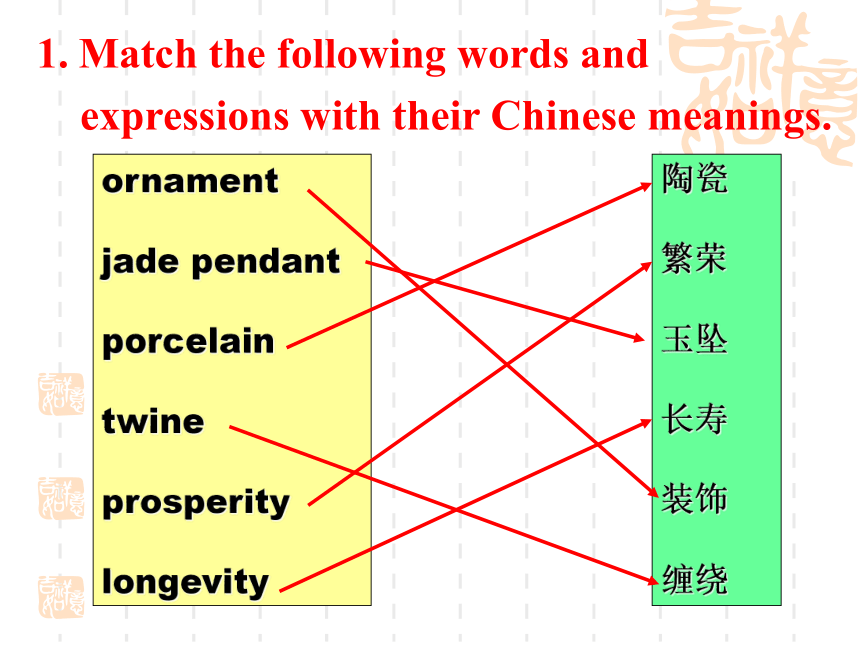
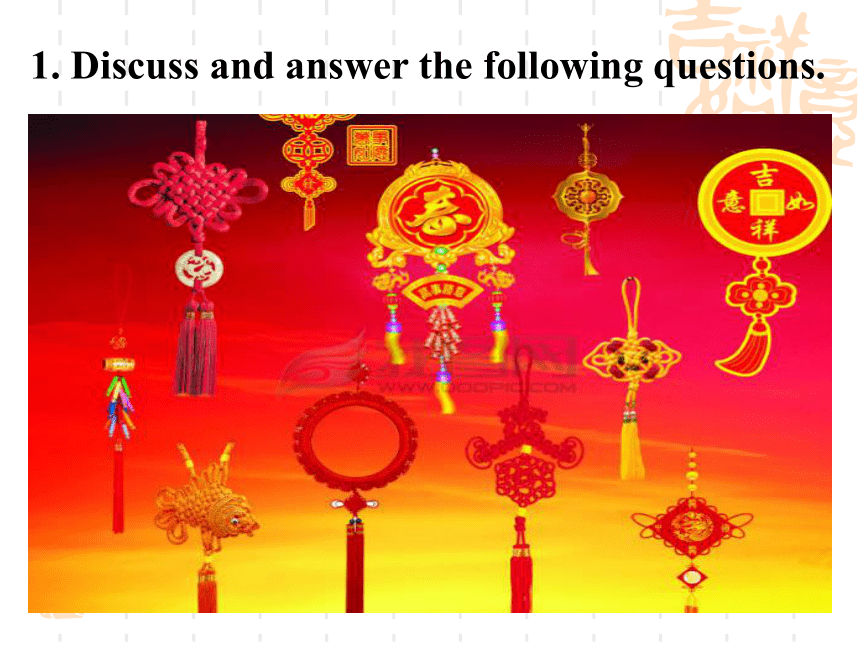
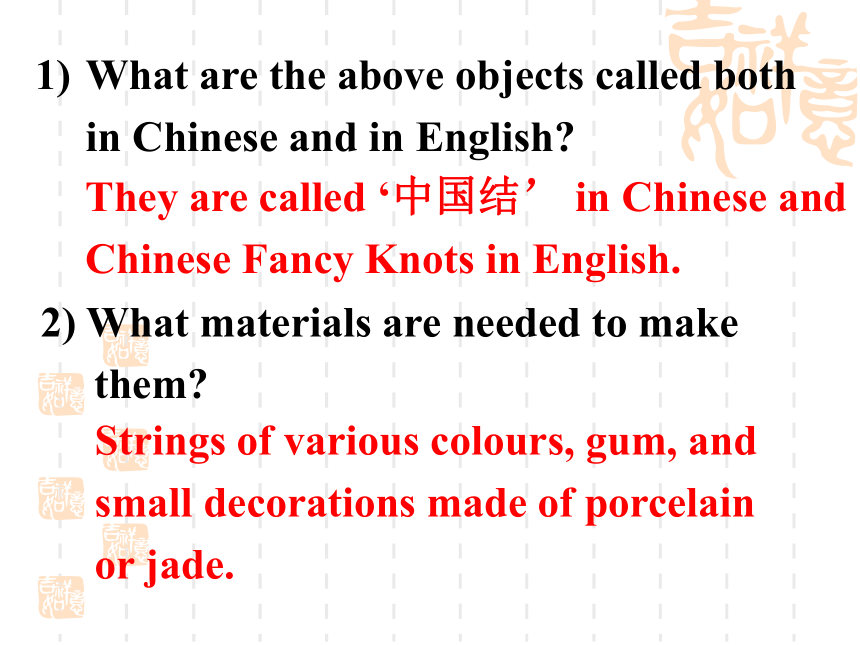


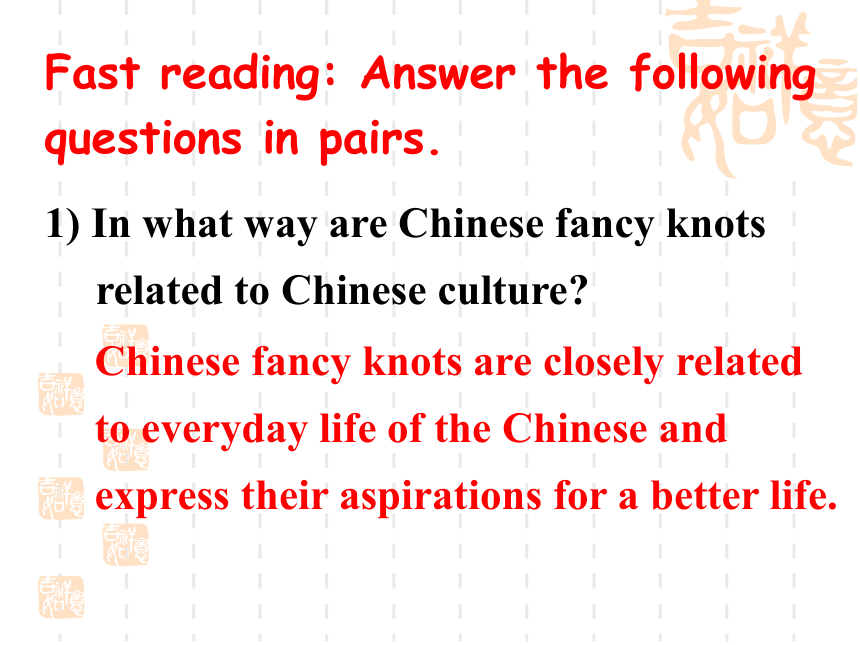

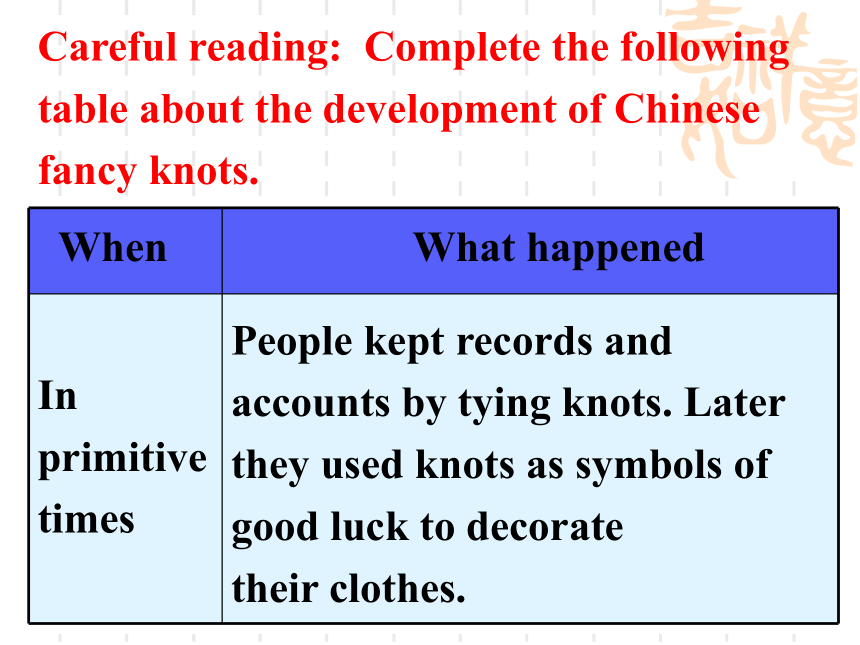
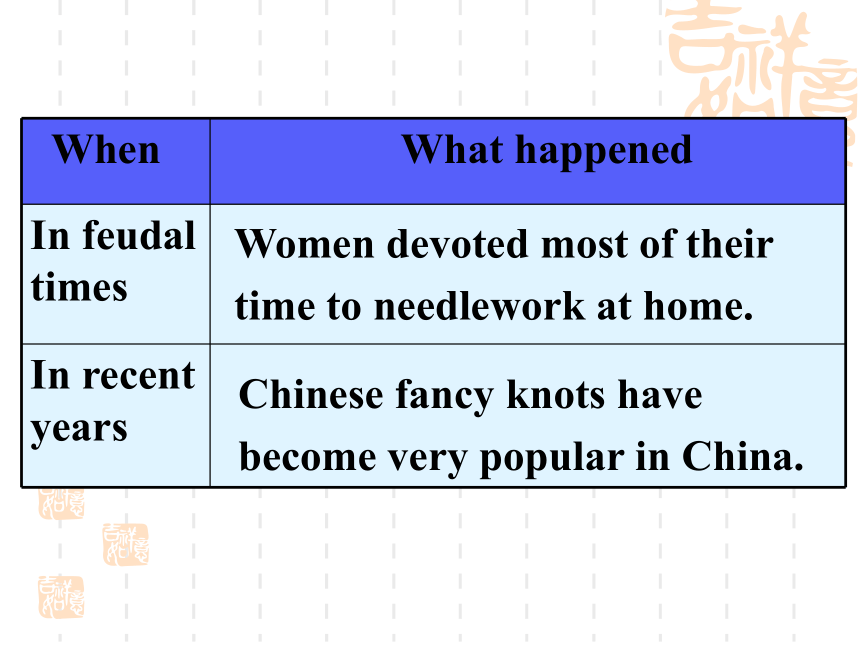
文档简介
(共43张PPT)
Unit 5
ornament
jade pendant
porcelain
twine
prosperity
longevity
陶瓷
繁荣
玉坠
长寿
装饰
缠绕
Match the following words and
expressions with their Chinese meanings.
1. Discuss and answer the following questions.
What are the above objects called both in Chinese and in English
They are called ‘中国结’ in Chinese and
Chinese Fancy Knots in English.
2) What materials are needed to make
them
Strings of various colours, gum, and small decorations made of porcelain or jade.
3) What are they used for
They are used as symbols of good luck to decorate houses, clothes, fans, and jade pendant and some other things.
4) What special meanings do they have
They are symbols of prosperity, happiness, wealth and longevity.
Chinese fancy knots are closely related to everyday life of the Chinese and express their aspirations for a better life.
1) In what way are Chinese fancy knots related to Chinese culture
Fast reading: Answer the following questions in pairs.
2) Why are Chinese knots important to
Chinese people
Because Chinese fancy knots are regarded as signs of happiness and good luck by the Chinese people.
Careful reading: Complete the following table about the development of Chinese fancy knots.
When What happened
In primitive times
People kept records and accounts by tying knots. Later
they used knots as symbols of good luck to decorate
their clothes.
When What happened
In feudal times
In recent years
Women devoted most of their time to needlework at home.
Chinese fancy knots have become very popular in China.
Decide whether each of the following statement is true or false. Correct the false one(s).
1) Chinese fancy knots were very popular in China.
2) Chinese fancy knots are all of complicated designs.
3) Chinese fancy knots are made of a single piece of string only.
T
F
simple or
T
4) In the past, Chinese women could go out often, so they made a lot of Chinese fancy knots and sold them.
5) An endless chain of knots symbolizes prosperity, happiness, wealth and longevity.
at home
not
F
T
Imagine that you are a reporter from America and very interested in Chinese fancy knots.
Ask your partner as many questions as possible about the Chinese fancy knots and then write a report.
1) How did the Chinese fancy knots come into being
2) What are Chinese fancy knots made of
3) What do Chinese fancy knots symbolize
4) …
1. They are handmade ornaments noted for their patterns and bright colors.
Language focuses:
合成词的过去分词表被动;合成词的现在分词表主动。例如:
high-sounding words高调
a much-travelled man 见闻广博的人
She is beginning a cottage industry with her handmade necklaces.
她正以自己手工制作的项链来开启自己的家庭手工生意。
The house was furnished entirely with handmade items.
这间房子陈列的全是手工制作的东西。
1) handmade
adj. 手工制作的
2) noted
adj. 有名的,著名的
a noted dancer
a town noted for its beautiful scenery
He is a noted authority on English literature.
他是著名的英国文学权威。
The garden has a lake copied from a noted one in China called Xihu.
公园里有一个湖是仿照中国著名的西湖建造的。
3) for
prep. 由于,因为
He jumped for joy.
他高兴地跳了起来。
noted for 以……而闻名
account for——解释;说明 answer for——对……负责 apply for——申请;请求 apologize for——为……而道歉 ask for——要求得到 beg for——请求 be anxious for——急于做 be bad for——有害于
for短语:
be convenient for——便于 be eager for——渴望 be famous for——以……出名 be fit for——适合于 be good for——利于 be grateful for——对……心存感激 be impatient for——对……不耐烦
be late for——迟到 be necessary for——有必要 be ready for——作好准备 be sorry for——为……而后悔 be responsible for——对……负责 be suitable for——适合于 be unfit for——不适合
be useful for——对……有作用 blame for——因……责备 call for——要求 care for——在意 enter for——报名参加 excuse for——宽恕 fight for——为……而战
for ever——永远 for example——例如 for all——尽管 for a song——非常便宜地 for certain——确切地 for company——陪着
2. Chinese fancy knots long ago found their
way to Japan,…
1) long adv.
①长久地,长期地
I knew Jonny long before I knew you.
②始终
all day long/ all night long
2) find one’s way to 设法到达
cut both ways 模棱两可
from way back 从远处,由来已久
give way 撤退,让步
go a long way大有帮助
clear the way for 为……扫清道路
find a way out 找到出路
fight one’s way 奋斗前进
feel one’s way 摸索着前进
way短语:
3. In primitive times, people kept records and accounts by tying knots.
account n. 叙述
Today’s paper carries an exciting account of the match.
今天的报纸刊载了这场比赛的精彩报道。
account n. 原因,解释
He retired on account of poor health.
由于身体不好他退休了。
account v. 说明
That accounts for his delay.
那是他推迟的原因。
4. These beautiful Chinese fancy knots, either of a simple or a complicated structure, are made of a single piece of string.
“(be) of+抽象名词”一般用来表示人或事物的性质或特征, 后接 value,use,help,difference,importance等抽象名词, 可用其同根形容词 valuable,useful,helpful,different,
important等替换, 且这些抽象名词前可用 little,some,any,no,great等修饰。如:The dictionary is of great help to us. (=The dictionary is very helpful to us.)
练习:
You will find this map of great _____ in helping you to get round London.
A. price B. cost C. value D. usefulness
You’ll find this map of great ____ in
helping you to get round London. (NMET97)
A.price B.cost
C.value D.usefulness
高考链接:
5. Chinese fancy knots are named after their shapes in accordance with what they suggest.
1) be named after 以…来命名
The baby was named after his grandfather.
name
短语:
by/of/under the name of
名叫…的
in the name of
以…的名义
to one’s name
属于自己所有
have one’s name
成名
call sb’s name
辱骂某人; 用各种难听的话骂(某人)
2) in accordance with 与…一致;按照
in accordance with =in agreement with
In accordance with his father’s wish he gave the money to the school. 他遵照他父亲的愿望把钱捐赠给了学校。
The accounts have always been handled
______ the banks policies.
A. in accordance with
B. in connection with
C. in contrast with
D. in line with
练一练:
6. As they are believed to be able to drive out evil spirits and bring luck, people often carry them or hang them in their homes.
as 因为,由于通常放在句首,引出原因
As he didn’t know much English, he looked up the word in the dictionary.
由于他英语懂得不多,他在字典中查阅这个单词。
because/since/as/for辨析:
这四个词都是表示原因或理由的连接词,
但as,because,since是从属连词,引导
原因状语从句,for是并列连词,所引导
的不是原因状语从句,而是表示理由的对
等句子,是对前面所讲内容补充和说明。
because引导的从句多置于句末,表示直
接的原因或理由,表示产生那种结果的必
然的因果关系,在回答why的提问时,必
须用because作答。
as与since引导的从句多置于句首,不过
as表示十分明显的原因,只说明一般的
因果关系,可译为“因为、由于”;而
since则表示稍加分析、对方已知的原
因,一般可译为“既然”。for引导的从句
一般放在句末,其前用逗号,它所叙述
的理由是间接的,即推测性理由,或是
对前面叙述的事实或看法的补充说明。
如:We stayed at home because it rained. 因为下雨我们呆在家里。
As he was not feeling well, I decided to go there alone.
由于他身体欠佳,我决定独自去那里。
Since everyone is here, let’s start.
既然大家都到了,咱们就开始吧。
There must be nobody in the classroom,for the light is off. 教室里一定没有人,因为灯灭了。
Unit 5
ornament
jade pendant
porcelain
twine
prosperity
longevity
陶瓷
繁荣
玉坠
长寿
装饰
缠绕
Match the following words and
expressions with their Chinese meanings.
1. Discuss and answer the following questions.
What are the above objects called both in Chinese and in English
They are called ‘中国结’ in Chinese and
Chinese Fancy Knots in English.
2) What materials are needed to make
them
Strings of various colours, gum, and small decorations made of porcelain or jade.
3) What are they used for
They are used as symbols of good luck to decorate houses, clothes, fans, and jade pendant and some other things.
4) What special meanings do they have
They are symbols of prosperity, happiness, wealth and longevity.
Chinese fancy knots are closely related to everyday life of the Chinese and express their aspirations for a better life.
1) In what way are Chinese fancy knots related to Chinese culture
Fast reading: Answer the following questions in pairs.
2) Why are Chinese knots important to
Chinese people
Because Chinese fancy knots are regarded as signs of happiness and good luck by the Chinese people.
Careful reading: Complete the following table about the development of Chinese fancy knots.
When What happened
In primitive times
People kept records and accounts by tying knots. Later
they used knots as symbols of good luck to decorate
their clothes.
When What happened
In feudal times
In recent years
Women devoted most of their time to needlework at home.
Chinese fancy knots have become very popular in China.
Decide whether each of the following statement is true or false. Correct the false one(s).
1) Chinese fancy knots were very popular in China.
2) Chinese fancy knots are all of complicated designs.
3) Chinese fancy knots are made of a single piece of string only.
T
F
simple or
T
4) In the past, Chinese women could go out often, so they made a lot of Chinese fancy knots and sold them.
5) An endless chain of knots symbolizes prosperity, happiness, wealth and longevity.
at home
not
F
T
Imagine that you are a reporter from America and very interested in Chinese fancy knots.
Ask your partner as many questions as possible about the Chinese fancy knots and then write a report.
1) How did the Chinese fancy knots come into being
2) What are Chinese fancy knots made of
3) What do Chinese fancy knots symbolize
4) …
1. They are handmade ornaments noted for their patterns and bright colors.
Language focuses:
合成词的过去分词表被动;合成词的现在分词表主动。例如:
high-sounding words高调
a much-travelled man 见闻广博的人
She is beginning a cottage industry with her handmade necklaces.
她正以自己手工制作的项链来开启自己的家庭手工生意。
The house was furnished entirely with handmade items.
这间房子陈列的全是手工制作的东西。
1) handmade
adj. 手工制作的
2) noted
adj. 有名的,著名的
a noted dancer
a town noted for its beautiful scenery
He is a noted authority on English literature.
他是著名的英国文学权威。
The garden has a lake copied from a noted one in China called Xihu.
公园里有一个湖是仿照中国著名的西湖建造的。
3) for
prep. 由于,因为
He jumped for joy.
他高兴地跳了起来。
noted for 以……而闻名
account for——解释;说明 answer for——对……负责 apply for——申请;请求 apologize for——为……而道歉 ask for——要求得到 beg for——请求 be anxious for——急于做 be bad for——有害于
for短语:
be convenient for——便于 be eager for——渴望 be famous for——以……出名 be fit for——适合于 be good for——利于 be grateful for——对……心存感激 be impatient for——对……不耐烦
be late for——迟到 be necessary for——有必要 be ready for——作好准备 be sorry for——为……而后悔 be responsible for——对……负责 be suitable for——适合于 be unfit for——不适合
be useful for——对……有作用 blame for——因……责备 call for——要求 care for——在意 enter for——报名参加 excuse for——宽恕 fight for——为……而战
for ever——永远 for example——例如 for all——尽管 for a song——非常便宜地 for certain——确切地 for company——陪着
2. Chinese fancy knots long ago found their
way to Japan,…
1) long adv.
①长久地,长期地
I knew Jonny long before I knew you.
②始终
all day long/ all night long
2) find one’s way to 设法到达
cut both ways 模棱两可
from way back 从远处,由来已久
give way 撤退,让步
go a long way大有帮助
clear the way for 为……扫清道路
find a way out 找到出路
fight one’s way 奋斗前进
feel one’s way 摸索着前进
way短语:
3. In primitive times, people kept records and accounts by tying knots.
account n. 叙述
Today’s paper carries an exciting account of the match.
今天的报纸刊载了这场比赛的精彩报道。
account n. 原因,解释
He retired on account of poor health.
由于身体不好他退休了。
account v. 说明
That accounts for his delay.
那是他推迟的原因。
4. These beautiful Chinese fancy knots, either of a simple or a complicated structure, are made of a single piece of string.
“(be) of+抽象名词”一般用来表示人或事物的性质或特征, 后接 value,use,help,difference,importance等抽象名词, 可用其同根形容词 valuable,useful,helpful,different,
important等替换, 且这些抽象名词前可用 little,some,any,no,great等修饰。如:The dictionary is of great help to us. (=The dictionary is very helpful to us.)
练习:
You will find this map of great _____ in helping you to get round London.
A. price B. cost C. value D. usefulness
You’ll find this map of great ____ in
helping you to get round London. (NMET97)
A.price B.cost
C.value D.usefulness
高考链接:
5. Chinese fancy knots are named after their shapes in accordance with what they suggest.
1) be named after 以…来命名
The baby was named after his grandfather.
name
短语:
by/of/under the name of
名叫…的
in the name of
以…的名义
to one’s name
属于自己所有
have one’s name
成名
call sb’s name
辱骂某人; 用各种难听的话骂(某人)
2) in accordance with 与…一致;按照
in accordance with =in agreement with
In accordance with his father’s wish he gave the money to the school. 他遵照他父亲的愿望把钱捐赠给了学校。
The accounts have always been handled
______ the banks policies.
A. in accordance with
B. in connection with
C. in contrast with
D. in line with
练一练:
6. As they are believed to be able to drive out evil spirits and bring luck, people often carry them or hang them in their homes.
as 因为,由于通常放在句首,引出原因
As he didn’t know much English, he looked up the word in the dictionary.
由于他英语懂得不多,他在字典中查阅这个单词。
because/since/as/for辨析:
这四个词都是表示原因或理由的连接词,
但as,because,since是从属连词,引导
原因状语从句,for是并列连词,所引导
的不是原因状语从句,而是表示理由的对
等句子,是对前面所讲内容补充和说明。
because引导的从句多置于句末,表示直
接的原因或理由,表示产生那种结果的必
然的因果关系,在回答why的提问时,必
须用because作答。
as与since引导的从句多置于句首,不过
as表示十分明显的原因,只说明一般的
因果关系,可译为“因为、由于”;而
since则表示稍加分析、对方已知的原
因,一般可译为“既然”。for引导的从句
一般放在句末,其前用逗号,它所叙述
的理由是间接的,即推测性理由,或是
对前面叙述的事实或看法的补充说明。
如:We stayed at home because it rained. 因为下雨我们呆在家里。
As he was not feeling well, I decided to go there alone.
由于他身体欠佳,我决定独自去那里。
Since everyone is here, let’s start.
既然大家都到了,咱们就开始吧。
There must be nobody in the classroom,for the light is off. 教室里一定没有人,因为灯灭了。
同课章节目录
- 3
- Unit 1 Friends and Friendship
- Unit 2 Between Parents and Us
- Unit 3 Motherly Love
- Unit 4 Dreams
- Unit 5 Wishes and Ambitions
- Unit 6 Perseverance
- Unit 7 Art
- Unit 8 Drama
- Unit 9 Poetry
- 4
- Unit 1 Project Hope
- Unit 2 Three Gorges
- Unit 3 Countries and Regions
- Unit 4 Plants
- Unit 5 Animals
- Unit 6 Man and Pets
- Unit 7 Neighborhood
- Unit 8 Workplace
- Unit 9 Living Today
